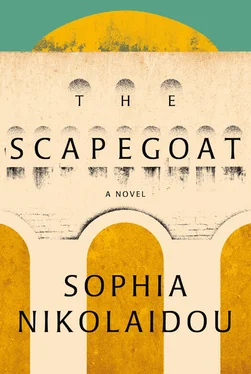Outside the office Evelina swore up and down, furious that she’d have to miss her cram school classes that Wednesday. Minas joked that they’d been issued a rare invitation from the administration to see the teachers in their natural habitat, fighting at a faculty meeting. He leaned over and whispered in her ear, laughed, then pursed his lips and blew a playful puff of air at her bangs. Evelina smoothed her hair with her fingers, annoyed. It had taken her half an hour to straighten it that morning. She started to say something, but decided against it. No matter what she said, she would still miss the explanation of the supine at her cram school. Nothing could make up for those lost hours of study.
Minas was watching an inchworm dance. As small as his fingernail, a sort of dirty color, with an agile tail that turned this way and that like a periscope. It was doing an acrobatics routine on a leaf, dangling from the green edge and bouncing as if on a trampoline. It looked like it was having fun.
— Well? What did the principal say? a first-year named Spiros came over and asked Minas. He was one of those kids who wander around during recess, desperate for someone to talk to.
— We’ll see, Minas said, letting the ambiguity hang in the air and turning back to his inchworm.
Spiros, a bony runt in glasses who never knew where to put his hands, didn’t budge. Better to be seen with Minas than alone.
That year Spiros had dared to sign up for the student council elections, he’d even drafted a list of proposals and passed out copies during assembly. Minas vaguely recalled something about a robotics workshop and a film club. He’d heard how the girls had giggled. But Spiros, unfazed, climbed up onto the stage where everyone could see him.
— I know I’m not much to look at, he began. I even have a limp, he added, pointing at one of his feet. Then, without any warning, he pulled up that leg of his sweat pants. It was all metal up to the knee.
— He’s a fool, Evelina remarked. But Minas clapped.
From that day on, whenever Spiros caught sight of Minas in the schoolyard, he came over and stuck to him like a burr. Evelina wouldn’t let it rest. I saw you with your best friend again , she’d tease, but Minas paid no attention.
— Well? the kid said, trying to play it cool. What do you think of our teachers?
— They’re a life form, too, Minas answered, then turned back to his inchworm.
CHRIST TAUGHT AND DIED
WHAT ARE OUR TEACHERS WAITING FOR?
The slogan appeared sometime on Tuesday night, on the eve of the faculty meeting, according to information the administration gleaned from the inhabitants of neighboring buildings. The man who lived directly across the street called at eight the next morning. For years he’d kindly painted over the graffiti on the outer walls of the school. He didn’t want to be paid, the principal could barely make him take money to cover the cost of the paint. But recently he’d seemed less eager to help, and at some point he let it slip that he’d been receiving threatening phone calls. The poor man was terrified. He’d just wanted to help out, he wasn’t looking to get mixed up in anything. It proved impossible for them to soothe his fears, and soon enough the outer walls were once again thick with scrawls.
The school board briefly considered the proposal of a parent who was a psychiatrist at an asylum in Stavroupoli and offered to bring a few of the inmates, non-violent ones, of course , to return the façade to some semblance of propriety. It sounded feasible, and would have been a cost-effective solution. But what principal wants to tell parents that their children’s school is going to be painted by a bunch of certified lunatics?
And so the slogans blossomed all over the building. The gutters were never cleaned, rainwater ran down the walls, the plaster flaked. And the crazies stayed locked up in their asylum. The only one who’d seen them was Minas, whose father was a journalist and often got him into places that were off-limits for other kids his age. Tasos Georgiou, usually incorruptible almost to a fault, thought it perfectly reasonable to pull whatever strings were necessary to gain his curious son access to such places — so long as Teta never found out. Minas’s father firmly believed that these experiences gave his son an important, if atypical, social education. And when Minas brought up the idea of visiting the Stavroupoli psychiatric hospital, Tasos approved.
So Minas went, and sat in the amphitheater and watched as a group of psychiatrists examined the patients. It seemed to him that each of the patients before them was living inside his own fully formed personal reality, which no one could shake. And not just the patients: the young doctor over to the right had studied in Paris and was wearing the white coat of an expert, but he didn’t seem much better off than the guy they were examining.
Logic, Minas decided as he watched the proceedings, was a poor tool in the hands of these obstinate people called doctors. Most of them made up their minds first, then looked for evidence. And yet they called that common sense.
As he was leaving he noticed a female inmate in the yard. A nurse was sitting on the next bench over, and never once let the woman out of his sight. Who knows , Minas thought, that woman there might have killed someone . They hadn’t told him that the violent ones were kept in the basement. They locked them up, drugged them, and never let them out.
Minas’s father was well-respected in his field. An old-school reporter , said everyone who worked with him. He was a deeply educated man who impressed them not with the superficial knowledge so many others had but with his steady, purposeful way of thinking, which showed he had devoted years to study. He knew how to guide the younger reporters, he gave clear instructions and sifted through their pitches carefully, choosing only the best. A good guy, and honest , is the first thing people said about Tasos Georgiou. At the meetings of the journalists’ union people shut up and listened when he spoke. His opinion counted with friends and enemies alike. He had climbed the ladder to an important administrative position, but he never moved up the hill to Panorama, the suburb where the rich Thessalonians lived. When the publisher who promoted him suggested upgrading his car, since there was no need for the editor-in-chief of a major daily paper to be driving around in an old Citroën, Georgiou spat fire. The publisher didn’t even get to finish her sentence. She’d been planning on offering him a very respectable Saab — this had been just a few years ago, yet in a different era, when money flowed freely — but she didn’t dare continue. The Citroën remained his trademark.
Georgiou was scrupulously fair. And his friends paid the price for it, since he tried to avoid anything that could be interpreted as favoritism. He made sure everyone knew that the paper wasn’t his personal fiefdom. A man of the street, he knew exactly who to call for the real story. Just play the fool , was his advice to the ambitious young staffers who worked under him, and who worshipped the ground he walked on. Playing the fool meant listening to everyone and keeping your mouth shut. A reporter doesn’t talk , he counseled them, that’s for the TV anchors who look nice on the screen but don’t know a thing about actual journalism .
News was his drug. He could sniff it out like a dog, from a distance. Even in recent years when he’d held senior staff positions, he never stopped reporting. The phone calls started first thing in the morning. His cell phone was always ringing, and he always picked up, because you just never know . A newspaper man to the core, he loved the smell of fresh ink, the feel of the paper. He never read the newspapers his wife would flip through at home, because she messed up sections and got the pages out of order. He teased her about it, but he was half serious, too.
Читать дальше












